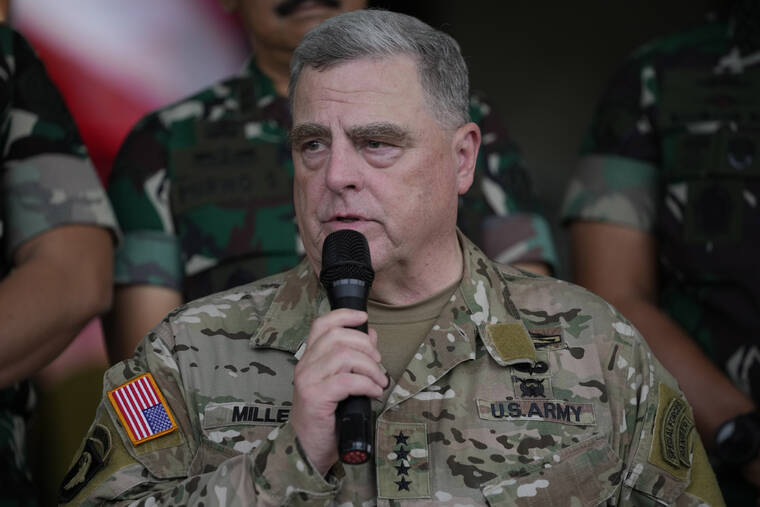Pacific defense chiefs meet against backdrop of rising China
SYDNEY — Defense chiefs from across the Indo-Pacific gathered this week to bolster their connections against a backdrop of China’s ongoing campaign to expand its influence and military presence in the region.
Gen. Mark Milley, chairman of the U.S. Joint Chiefs of Staff, said the military leaders meeting for three days in Sydney are focused on “the whole situation with the rise of China, a free and open Pacific” and ensuring a peaceful and stable Indo-Pacific region.
“It’s a big conference to coordinate our mutual security interests and discuss national security issues that apply to all of us,” said Milley.
Military leaders from 26 nations are participating in the conference, and most of those are chiefs of defense. China was invited but said it would be unable to attend.
During a press conference Wednesday, Milley said the chiefs of defense discussed how they can cooperate more and make their militaries more interoperable, including with advanced technologies. He added that they also talked about military exercises.
He and Gen. Angus Campbell, Australia’s chief of defense, didn’t go into details. But Milley expanded on comments he made late last week about China’s increasing aggressiveness in the region and the need for nations to ensure that the Pacific remains free and open to all.
Chinese intercepts of allied and partner aircraft in international airspace in the Pacific region have increased “several-fold” over the last five years, Milley said, calling Beijing’s behavior “much more confrontational” than five to 15 years ago.
China’s activity, he said, “seems to imply that they want to bully or dominate, as opposed to having a free and open” Pacific.
Asked whether the U.S. would increase its military presence in Australia or in other partner nations, Milley and Campbell said the discussions are ongoing and no decisions have been made. There are about 2,200 U.S. Marines in Darwin.
En route to the conference, Milley told reporters traveling that the Chinese military has become significantly more aggressive and dangerous in recent years.
U.S. President Joe Biden plans to speak to Chinese President Xi Jinping on Thursday, according to a U.S. official who declined to be identified ahead of the public announcement.
The U.S. is also grappling with reports that House Speaker Nancy Pelosi is considering a trip to Taiwan — roiling China and setting off waves of worry in the Biden administration.
Asked about the potential Pelosi trip, Milley would only say that discussion of any specific travel is premature. But, he added, “if there’s a decision made that Speaker Pelosi or anyone else is going to travel and they asked for military support, we will do what is necessary to ensure a safe conduct of their visit. And I’ll just leave it at that.”
The conference also coincides with the massive Rim of the Pacific naval exercise going on near Hawaii. RIMPAC is the world’s largest maritime exercise and is hosted by the U.S.

